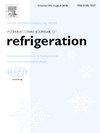Assessment of refrigerant emissions from air conditioners in Brazil
IF 3.5
2区 工程技术
Q1 ENGINEERING, MECHANICAL
International Journal of Refrigeration-revue Internationale Du Froid
Pub Date : 2025-07-10
DOI:10.1016/j.ijrefrig.2025.07.010
引用次数: 0
Abstract
Refrigerant fluids have a high global warming potential and consequently contributes to maintaining high levels of radiative forcing into the atmosphere. This paper aims to present knowledge regarding the conditions of refrigerant emissions from leakage and disposal of air conditioners in the Brazilian household sector. There is a significant grow in the ownership of air conditioners and it represents an increase in emissions of hydrochlorofluorocarbons (HCFCs) and hydrofluorocarbons (HFCs) that are used in air conditioners that operate in the country. A methodological approach is developed and applied to estimate the current emissions and to simulate scenarios where each refrigerant and its respective global warming potential is accounted. Additionally, the impacts of the Kigali amendment and the current regulations are assessed. The main finding is that the ratification of the Kigali amendment should reduce the refrigerant emissions from 2.8 million tons of CO2e in 2024 to 1.2 million tons of CO2e in 2050. Moreover, is also verified the need of further developments in promoting training, certifications and regulations in order to promote a more effective reverse logistic to recover and recycle refrigerants in servicing and disposal of air conditioners. New surveys and scientific researches also are recommended to tackle the lack of data and statistics related to refrigerants leakage in Brazil and to provide innovative solutions to minimize this source of emissions.
巴西空调制冷剂排放评估
制冷剂流体具有很高的全球变暖潜势,因此有助于维持进入大气的高水平辐射强迫。本文旨在介绍有关巴西家庭部门空调泄漏和处置的制冷剂排放条件的知识。空调的拥有量显著增加,这表明在该国运行的空调中使用的氢氯氟烃(HCFCs)和氢氟碳化物(hfc)的排放量有所增加。开发并应用了一种方法方法来估计当前的排放量,并模拟每种制冷剂及其各自的全球变暖潜势。此外,还评估了基加利修正案和现行条例的影响。主要发现是,基加利修正案的批准将使制冷剂排放量从2024年的280万吨二氧化碳当量减少到2050年的120万吨二氧化碳当量。此外,还证实需要在促进培训、核证和规章方面进一步发展,以便在维修和处置空调时促进更有效的回收和再循环制冷剂的逆向物流。还建议进行新的调查和科学研究,以解决巴西缺乏与制冷剂泄漏有关的数据和统计数据的问题,并提供创新的解决办法,尽量减少这一排放源。
本文章由计算机程序翻译,如有差异,请以英文原文为准。
求助全文
约1分钟内获得全文
求助全文
来源期刊
CiteScore
7.30
自引率
12.80%
发文量
363
审稿时长
3.7 months
期刊介绍:
The International Journal of Refrigeration is published for the International Institute of Refrigeration (IIR) by Elsevier. It is essential reading for all those wishing to keep abreast of research and industrial news in refrigeration, air conditioning and associated fields. This is particularly important in these times of rapid introduction of alternative refrigerants and the emergence of new technology. The journal has published special issues on alternative refrigerants and novel topics in the field of boiling, condensation, heat pumps, food refrigeration, carbon dioxide, ammonia, hydrocarbons, magnetic refrigeration at room temperature, sorptive cooling, phase change materials and slurries, ejector technology, compressors, and solar cooling.
As well as original research papers the International Journal of Refrigeration also includes review articles, papers presented at IIR conferences, short reports and letters describing preliminary results and experimental details, and letters to the Editor on recent areas of discussion and controversy. Other features include forthcoming events, conference reports and book reviews.
Papers are published in either English or French with the IIR news section in both languages.

 求助内容:
求助内容: 应助结果提醒方式:
应助结果提醒方式:


